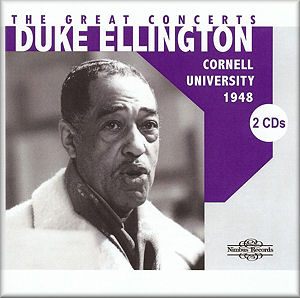CD 1
1. Star Spangled Banner
2. Lady of the Lavender Mist
3. Suddenly It Jumped
4. Reminiscing in Tempo
5. She Wouldn't Be Moved
6. Paradise
7. The Symphomaniac Pt. 1
8. The Symphomaniac Pt. 2
9. My Friend
10. You Oughta
11. Creole Love Call
12. Don't Blame Me
13. Lover Man
14. The Tattooed Bride
15. Dancers In Love
CD 2
1. Manhattan Murals
2. Hy'a Sue
3. Fantazm
4. Tootin' Through The Roof
5. Brown Betty
6. Humoresque
7. How High The Moon
8. Don't Be So Mean To Baby
9. Lover Come Back To Me
10. It's Monday Everyday
11. Medley: Don t Get Around Much Anymore; Do Nothing Till You Hear
from Me; In A Sentimental Mood; Mood Indigo; I m Beginning To See
The Light; Sophisticated Lady; Caravan; It Don t Mean A Thing; I Let
A Song Go Out Of My Heart
12. Limehouse Blues
Duke Ellington and his Orchestra
rec. 10 December 1948 at Cornell University
Cornell welcomed the Duke and his Orchestra with open arms. Its reward
was a concert of the familiar virtues served up by the poet-painters
in the band’s ranks, and now for us.
There can be few sounds more thrilling than the typically upbeat
Star Spangled Banner with which the Duke customarily opened
his concerts at around this time. Once into the First Set we are introduced
to the lauded ranks. Ellington himself has an extended outing early
on in Suddenly It Jumped with the shouting brass boldly led
by Shorty Baker. The fascinatingly voiced Reminiscing in Tempo
was always a speciality number, its pervasive melancholia ultimately
unquenched even by the more swinging second part. The melancholy in
Ellington is a subject all in itself and one that has been studiedly
under-explored. Paradise is a Billy Strayhorn vehicle for the
rhapsodic entreaties of the unique Harry Carney, which prefaces the
pervasively satiric elements of The Symphomaniac (Parts 1 and 2).
This bipartite affair is a kind of historical overview of ‘Then
and Now’ and allows Duke the chance to throw in pastiche Ferde Grofé-type
arrangements (Then) and contrast them with the sound of things now.
Al Sears tended to be overlooked in the tenor chair. One could certainly
imagine the same misfortune at Cornell because beside him sat none
other than Ben Webster, but Duke cannily gives Sears the chance to
unfold his gospel tinged wares on My Friend. And whilst we
consider inimitable voices, those allergic to the high note spectaculars
of Cat Anderson might like to note that his predecessor here, Al Killian,
explores considerably less stratospheric heights in his outings, notably
You Oughta. Kay Davis reprises Adelaide Hall in Creole Love
Call whilst Ray Nance keeps her company. Fortunately Ellington
is well featured as her accompanist on Lover Man – Davis is
far more oratorical than Billie Holiday. Admirers of Jimmy Hamilton
will note his lower register clarinet work on The Tattooed Bride.
The Second Set continues the good work. Manhattan Murals is
a Take the ‘A’ Train soundalike. Hy'a Sue meanwhile
is an uncomplicated Blues with Tyree Glenn’s trombone to the fore,
then Hamilton on tenor this time. We have to wait until Brown Betty
for Johnny Hodges to be unveiled in all his rhapsodic majesty
whilst Nance’s violin leads the dance, rather appropriately, on Humoresque,
by that well known hepcat Antonín Dvorák. And then – finally –
soon after Hodges we get the other great saxophonist, Webster, in
his feature How High The Moon. The Anthem of Bop receives a
rhapsodic and tremendous up-tempo workout. Al Hibbler was useful to
Ellington but his baroque vocals do little for anyone else. Better
to hear the righteous preaching of Lawrence Brown in It's Monday
Everyday. There then follows one of Ellington’s more Beechamesque
vocal introductions to the concluding Limehouse Blues in which
Glenn’s (underrated) vibraphone playing is pithily introduced.
Of course devotees will know that Ellington’s performances on disc
and in concert are voluminous, and that this repertoire was multiply
recorded. It was however a good night at Cornell and this two disc
set preserves a concert of real brio and drama.
Jonathan Woolf
See additional reviews by Pierre
Giroux and Don
Mather.
